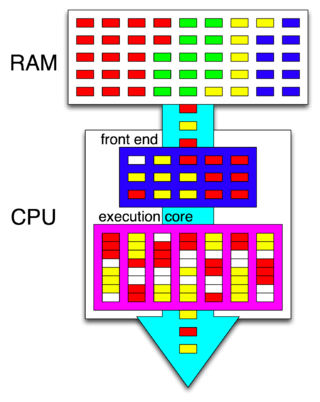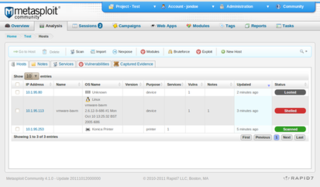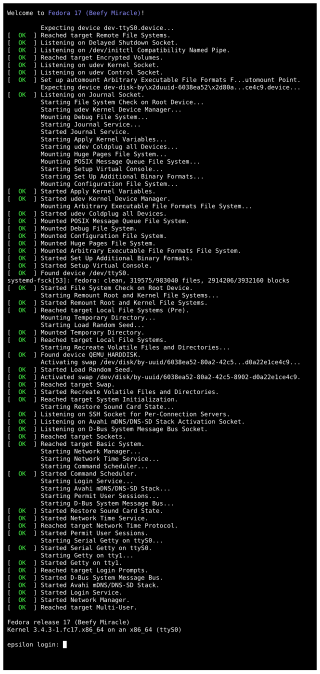
Debian, also known as Debian GNU/Linux, is a Linux distribution composed of free and open-source software and optionally non-free firmware or software developed by the community-supported Debian Project, which was established by Ian Murdock on August 16, 1993. The first version of Debian (0.01) was released on September 15, 1993, and its first stable version (1.1) was released on June 17, 1996. The Debian Stable branch is the most popular edition for personal computers and servers. Debian is also the basis for many other distributions that have different purposes, like Proxmox for servers, Ubuntu or Linux Mint for desktops, Kali for penetration testing, and Pardus and Astra for government use.

rsync is a utility for transferring and synchronizing files between a computer and a storage drive and across networked computers by comparing the modification times and sizes of files. It is commonly found on Unix-like operating systems and is under the GPL-3.0-or-later license.

Hyper-threading is Intel's proprietary simultaneous multithreading (SMT) implementation used to improve parallelization of computations performed on x86 microprocessors. It was introduced on Xeon server processors in February 2002 and on Pentium 4 desktop processors in November 2002. Since then, Intel has included this technology in Itanium, Atom, and Core 'i' Series CPUs, among others.
Address space layout randomization (ASLR) is a computer security technique involved in preventing exploitation of memory corruption vulnerabilities. In order to prevent an attacker from reliably redirecting code execution to, for example, a particular exploited function in memory, ASLR randomly arranges the address space positions of key data areas of a process, including the base of the executable and the positions of the stack, heap and libraries.
Advanced Configuration and Power Interface (ACPI) is an open standard that operating systems can use to discover and configure computer hardware components, to perform power management, auto configuration, and status monitoring. It was first released in December 1996. ACPI aims to replace Advanced Power Management (APM), the MultiProcessor Specification, and the Plug and Play BIOS (PnP) Specification. ACPI brings power management under the control of the operating system, as opposed to the previous BIOS-centric system that relied on platform-specific firmware to determine power management and configuration policies. The specification is central to the Operating System-directed configuration and Power Management (OSPM) system. ACPI defines hardware abstraction interfaces between the device's firmware, the computer hardware components, and the operating systems.
The OpenBSD operating system focuses on security and the development of security features. According to author Michael W. Lucas, OpenBSD "is widely regarded as the most secure operating system available anywhere, under any licensing terms."

The Metasploit Project is a computer security project that provides information about security vulnerabilities and aids in penetration testing and IDS signature development. It is owned by Boston, Massachusetts-based security company Rapid7.

Amazon Elastic Compute Cloud (EC2) is a part of Amazon.com's cloud-computing platform, Amazon Web Services (AWS), that allows users to rent virtual computers on which to run their own computer applications. EC2 encourages scalable deployment of applications by providing a web service through which a user can boot an Amazon Machine Image (AMI) to configure a virtual machine, which Amazon calls an "instance", containing any software desired. A user can create, launch, and terminate server-instances as needed, paying by the second for active servers – hence the term "elastic". EC2 provides users with control over the geographical location of instances that allows for latency optimization and high levels of redundancy. In November 2010, Amazon switched its own retail website platform to EC2 and AWS.

OpenBSD is a security-focused, free and open-source, Unix-like operating system based on the Berkeley Software Distribution (BSD). Theo de Raadt created OpenBSD in 1995 by forking NetBSD 1.0. The OpenBSD project emphasizes portability, standardization, correctness, proactive security, and integrated cryptography.
The Pwnie Awards recognize both excellence and incompetence in the field of information security. Winners are selected by a committee of security industry professionals from nominations collected from the information security community. Nominees are announced yearly at Summercon, and the awards themselves are presented at the Black Hat Security Conference.
This is a comparison of online backup services.
Jungle Disk is both the name of an online backup software service and a privately held data security company. It was one of the first backup services to use cloud storage and Amazon S3. In 2009 after being acquired by Rackspace the service added Rackspace Cloud Files. The name is a word association as the Amazon rainforest is a Jungle and Disk is a common shorthand for a hard disk drive.

Ubuntu One is an OpenID-based single sign-on service operated by Canonical Ltd. to allow users to log onto many Canonical-owned Web sites. Until April 2014, Ubuntu One was also a file hosting service and music store that allowed users to store data "in the cloud".

systemd is a software suite that provides an array of system components for Linux operating systems. The main aim is to unify service configuration and behavior across Linux distributions. Its primary component is a "system and service manager" – an init system used to bootstrap user space and manage user processes. It also provides replacements for various daemons and utilities, including device management, login management, network connection management, and event logging. The name systemd adheres to the Unix convention of naming daemons by appending the letter d. It also plays on the term "System D", which refers to a person's ability to adapt quickly and improvise to solve problems.
A bug bounty program is a deal offered by many websites, organizations, and software developers by which individuals can receive recognition and compensation for reporting bugs, especially those pertaining to security exploits and vulnerabilities.

Heartbleed is a security bug in some outdated versions of the OpenSSL cryptography library, which is a widely used implementation of the Transport Layer Security (TLS) protocol. It was introduced into the software in 2012 and publicly disclosed in April 2014. Heartbleed could be exploited regardless of whether the vulnerable OpenSSL instance is running as a TLS server or client. It resulted from improper input validation in the implementation of the TLS heartbeat extension. Thus, the bug's name derived from heartbeat. The vulnerability was classified as a buffer over-read, a situation where more data can be read than should be allowed.

Katie Moussouris is an American computer security researcher, entrepreneur, and pioneer in vulnerability disclosure, and is best known for her ongoing work advocating responsible security research. Previously a member of @stake, she created the bug bounty program at Microsoft and was directly involved in creating the U.S. Department of Defense's first bug bounty program for hackers. She previously served as Chief Policy Officer at HackerOne, a vulnerability disclosure company based in San Francisco, California, and currently is the founder and CEO of Luta Security.

Colin A. Percival is a Canadian computer scientist and computer security researcher. He completed his undergraduate education at Simon Fraser University and a doctorate at the University of Oxford. While at university he joined the FreeBSD project, and achieved some notoriety for discovering a security weakness in Intel's hyper-threading technology. Besides his work in delta compression and the introduction of memory-hard functions, he is also known for developing the Tarsnap online backup service, which became his full-time job.

Meltdown is one of the two original transient execution CPU vulnerabilities. Meltdown affects Intel x86 microprocessors, IBM POWER processors, and some ARM-based microprocessors. It allows a rogue process to read all memory, even when it is not authorized to do so.

Spectre is one of the two original transient execution CPU vulnerabilities, which involve microarchitectural timing side-channel attacks. These affect modern microprocessors that perform branch prediction and other forms of speculation. On most processors, the speculative execution resulting from a branch misprediction may leave observable side effects that may reveal private data to attackers. For example, if the pattern of memory accesses performed by such speculative execution depends on private data, the resulting state of the data cache constitutes a side channel through which an attacker may be able to extract information about the private data using a timing attack.











